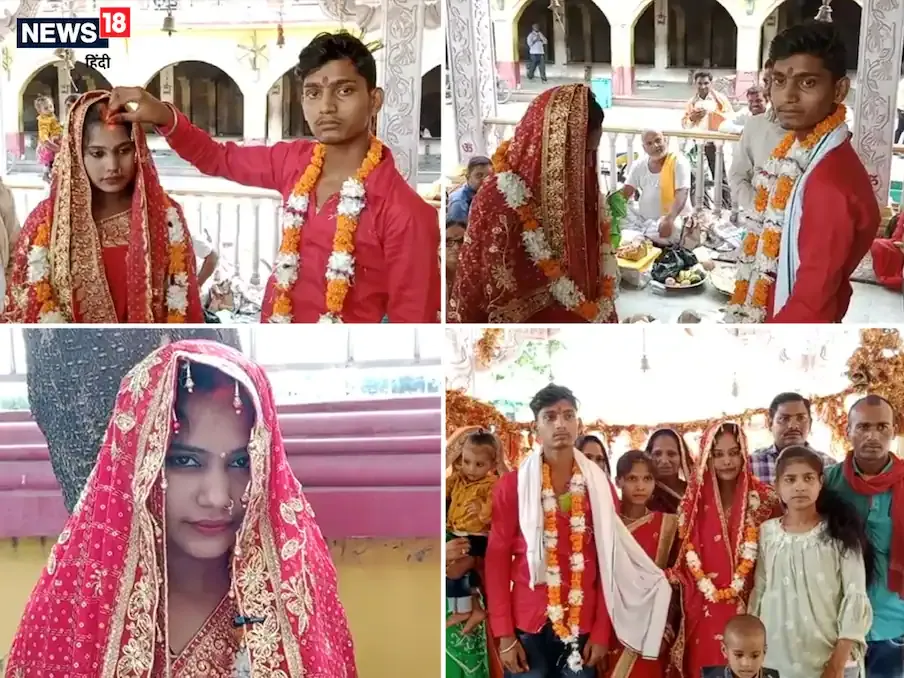 |
| Muslim Women "Momin Khatun" married "Suraj" in a temple in Azamgarh. Image Source: Dainik Bhaskar |
by - Aisha Ghosh
Why Are Muslim women interested in marrying Hindu men?
I am a Muslim woman who married a Hindu man and am now a Hindu. So I’m talking from my personal opinion and experiences.
In my personal experience, I would say yes. Most are interested, but only a few actually take the step. That’s because they are taught from childhood to always obey unquestioningly and that to marry a non-Muslim is Haraam. Also, the repercussions of marrying a non-Muslim man can be very severe…ex-communication from the community at the least, and rape, torture & death at the worst.
 |
| A Muslim woman embraced the Hindu religion and married a Hindu man in Khambhat city in Gujarat. |
There are multiple reasons why Muslim women find Hindu men fascinating:
1. The most common reason is the thrill of wanting something that’s forbidden for you. Muslim women are forbidden from marrying a non-Muslim unless he also converts to Islam. So it's the fascination with the forbidden fruit, so to speak, that draws us most to Hindu or other non-Muslim men. This was one of the reasons for my being attracted to the man who later became my husband.
2. Hindu guys are generally more chilled out and comfortable in their approach. Muslim men since childhood are instilled with a sense of persecution, which tends to bring out an unnecessarily aggressive side to their behavior, which many women find a turn-off. Women prefer cool, friendly guys and do not try to portray themselves as aggressive and domineering for no reason. I know many Muslim women who find this ‘irritating’, for lack of a better word. We prefer Hindu men as they don’t live with a persecution complex, are easy to talk to, and are comfortable in themselves.
3. Then there are not so nice experiences that Muslim women sometimes go through after which they see marrying a Hindu (or any other non-Muslim) as an escape from their situations. Both of the incidents below happened when I was still a Muslim.
- A. For example, I had a friend who used to be physically and verbally abused by her husband. She told her mother and other elders multiple times about it but got no help of any sort. Finally, she met a kind Hindu man at work, fell in love and decided to elope with him, and later married him. Instead of supporting her for having escaped an abusive marriage, her parents abused her and reported her to the mosque. Consequently, they had to change cities and she had to change her name. The sad part for her is she had to cut ties with everyone….parents, siblings, friends…everyone.
- B. Another instance was my cousin. Her husband one fine day gave her triple talaq, just out of the blue. She still does not know why. Immediately, she was thrown out of her home with nothing but the clothes she was wearing. She was forced to walk a distance of 5–6km to her parent’s home in a black burqa at 2pm on a hot summer afternoon under a blazing sun with a temperature of 40+ C. She barely managed to reach her parent’s home and just collapsed due to the intense heat and suffered a heatstroke. She had to be taken to a hospital where she just about survived after 3 days of hospitalization.
4. Fascination with colorful Hindu festivals: Hindu festivals like Holi, Divali, Durga Puja, and Ganpathi are more colorful and fun than Muslim festivals which are staid, formal, and boring affairs. As the old 80s song says…” Girls Just Want to Have Fun” very much holds true. I remember how I and my Muslim friend used to be so envious of our Hindu friends who would tell us the next day in the office of all the fun they had during Holi and Durga Puja. Even the little bit of left-over color behind the ears on the day after Holi.
5. Gender inclusiveness of Hindu culture: For example, Hindu festivals like Divali. Holi, Durga Puja, and Ganpathi…are by nature inclusive there is no gender segregation and everyone enjoys the occasions together and prays together. You would have seen that during Muslim festivals like Eid, the men and the women are usually separate.
6. There are some Muslim practices that I’ve always found abhorrent.
- A. The Eid practice of slaughtering the goat right on the common landing of apartment buildings, making a bloody mess of the place. Leave alone it being unhygienic, I feel it's really so disrespectful towards non-Muslim neighbors. I don’t know why, but I’ve seen too many instances of Muslims trying to “dominate” their neighbors for no particular reason, even if the neighbors are very nice, civil, and friendly people.
- B. The practice of getting a boy child as small as 8–9 years to do Qurbani (sacrificial killing) of a goat. I feel many do it just with the objective of making children more aggressive and desensitized to the sight of blood and to the idea of killing. It's like making the child take the first step towards radicalization.
- C. The Shia practice of cutting a child’s forehead during Muharram, men walking down the streets beating themselves, and even cutting themselves is one more practice I’ve always hated.











Does some Muslims being bad mean Islam itself is bad? No. It is wrong to leave Islam because some of some Muslims. Learn about Islam and fear the awful fire of hell that waits. May Allah guide you.
ReplyDelete